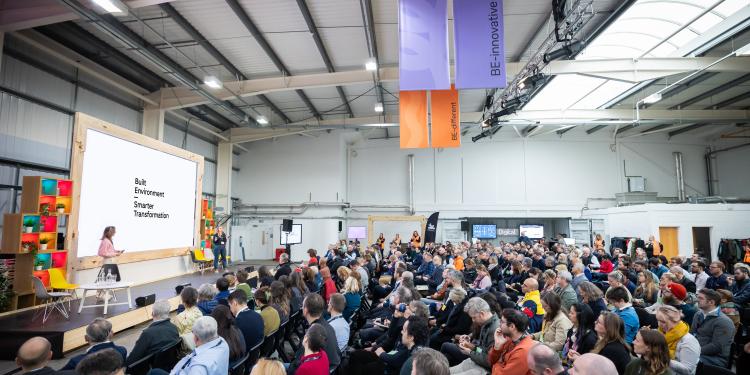Setting the standard for the future of green retrofit

£1.2 million government grant supports sustainability upgrades at BE-ST, Scotland’s National Retrofit Centre, administered by Edinburgh Napier University
A comprehensive green retrofit project at Edinburgh Napier University’s BE-ST innovation centre is set to act as a test bed and living case study for decarbonisation works in the built environment sector.
Focused on upgrades to their Accelerator Lab – also known as the A Lab – the works aim to transform the space into a demonstration of best practice in the retrofit of non-domestic buildings. The A Lab hosts a national retrofit academy, a skills academy and outreach programmes.
Caitriona Jordan, head of retrofit programmes at BE-ST, said: “By retrofitting Scotland's National Retrofit Centre, we are aiming to set a benchmark for what the retrofit of a complex, multi-use non-domestic building could look like.”
By retrofitting Scotland's National Retrofit Centre, we are aiming to set a benchmark for what the retrofit of a complex, multi-use non-domestic building could look like.
Project measures include the removal of the existing boiler-based heating system, replacing this with a zero direct emissions air source heat pump. Solar panels will be installed on the roof of the building, with the energy generated from this source set to aid the electrical capacity required to run the heat pump.
Accompanying energy efficiency upgrades include building fabric insulation on external walls, floors, the roof, double glazing, dry wall lining and draught proofing. Air handling unit fans will also support ventilation and the LED lighting controls will be centralised to allow for more efficient use of energy for this purpose.
As the works progress and following project completion, the university will use lessons and challenges to inform future retrofit projects both across their estate, Scotland’s built environment and beyond.
Caitriona added: “The National Retrofit Centre retrofit will provide both a living demonstrator and a roadmap for similar projects across Scotland and beyond.
“The building's retrofit journey itself will inevitably generate valuable insights and we will be doing everything we can to make sure that industry can come along on this journey and learn from the experience too.
“We hope by overcoming the challenges that might arise during the process, this retrofit will start to lower the perceived risk of undertaking other projects like this.”
The National Retrofit Centre retrofit will provide both a living demonstrator and a roadmap for similar projects across Scotland and beyond.
Works are anticipated to save 41.47 tonnes or carbon emissions and more than £20,000 in energy bills annually.
To support the project, the university has been awarded £1,241,966 through Scotland’s Public Sector Heat Decarbonisation Fund. Funding is delivered by Salix on behalf of the Scottish Government.
Brandon Dillon, client support officer at Salix, said: “We are thrilled to support Edinburgh Napier University with this inspiring project at their BE-ST innovation centre.
“By sharing their own retrofit experience with others, the university is helping to support the societal transition to a low-emission future, not just for Scotland and the UK, but for the world.”
About BE-ST
BE-ST (Built Environment – Smarter Transformation), formerly known as the Construction Scotland Innovation Centre, is an international centre for excellence that collaborates across the entire build environment to bring stakeholders together to accelerate the transition to net zero. The centre is hosted by Edinburgh Napier University.
About Scotland’s Public Sector Heat Decarbonisation Fund
Launched in July 2023, Scotland’s Public Sector Heat Decarbonisation Fund made grant funding available from Scottish Government for projects to decarbonise heating systems by replacing them with zero direct emissions systems.
It also includes funding for retrofit energy efficiency measures to support the overall decarbonisation of heat in buildings.
The scheme will deliver funding to successful applicants for projects due to complete by the end of financial year 2024/25.
We expect to publish a full list of successful applicants later this year.
You can read more about the scheme through our website.

